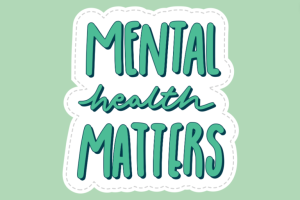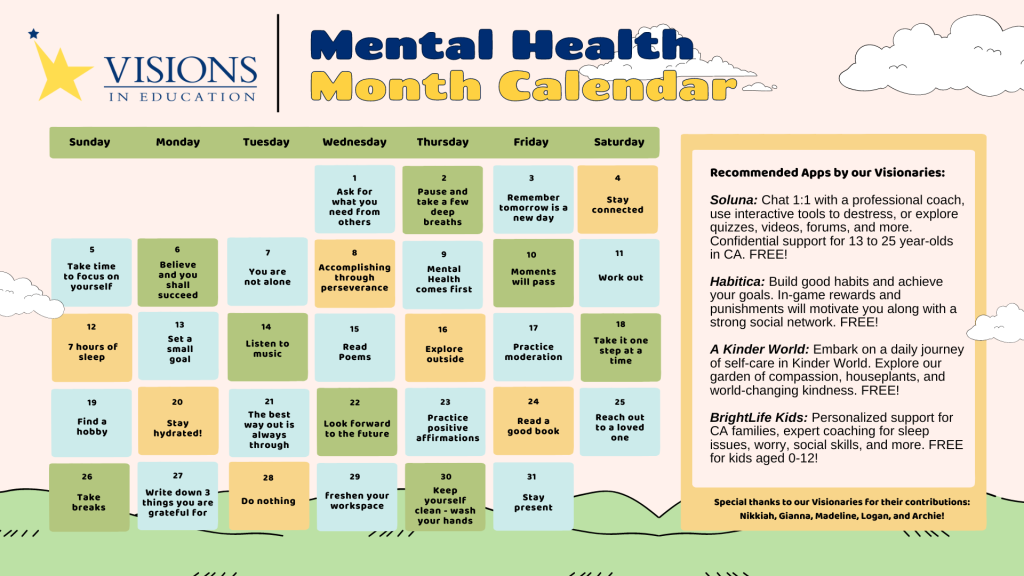
May is Mental Health Awareness Month
If you or a loved one needs assistance, please see these resources.
Mental Health Awareness Month is observed every May and is a time to raise awareness about the importance of mental health and wellness. It’s also an opportunity to share our stories, connect with others, and address mental health challenges in an effort to destigmatize and prioritize the well-being of all individuals. Join us this month as we share different resources to help create space for open and honest conversations about mental health awareness.
The Mental Health Month Calendar below illustrates different activities that you can do throughout May to put your mental health first. Thank you to our our Empowering Voices club for brainstorming all of these amazing ideas!

Special thanks to Empowering Voices club members Nikkiah, Gianna, Madeline, Logan and Archie for their calendar tips and insight into the many aspects of mental health awareness. Stay tuned for more Mental Health Awareness content and resources throughout the month!
Insights from Our Empowering Voices Club
Visions’ Empowering Voices club is a space for students to come together to share their voices and raise awareness of mental health and wellness. For Mental Health Awareness Month, we asked the club a series of questions about mental health stereotypes, how to support a friend, and more. Read some of their responses below.
How do you think societal expectations or stereotypes about mental health impacts teenagers, and what can be done to challenge and change these perceptions?
“I think societal expectations or stereotypes about mental health impact teenagers negatively in that some teens fear speaking about their mental health as a fear of being seen as abnormal or weird. I believe that having more open and honest conversations about certain perceptions can help to make some changes.”
“I don’t believe that anyone who has not gone through a mental health crisis will have much of a stance on mental health awareness. Veterans may come home from a deployment traumatized, they could feel isolated because their friends would not be able to relate to civilians who were not in combat. Similarly people who have gone through physical, psychological, sexual, and or emotional trauma may also feel isolated because general people may not have gone through similar trauma, and not be able to relate to the traumatized person.”
“I think mental health is a topic that people are just beginning to speak about, so it is not yet regarded as something everyone can struggle with. Teenagers may compare their experiences to others, and feel guilty for seeking out support because other people ‘have it worse’. However, when people speak about physical health, they do not compare their own experiences and challenges in this way. If someone were to break their leg and seek out help at a hospital, they would not feel guilty because there are other people there who are more badly hurt. A broken leg requires care. However, when it comes to mental health, the standard for when help is necessary has not yet been fully formed. Many people may remain in denial about whether or not they deserve to seek out support, and even if they know they need help, they might be confused on who to turn to or what to do.”
How do you support your friends or peers who may be struggling with their mental health? What advice would you give to someone who wants to be a supportive friend?
“I support my friends and peers who may be struggling with their mental health by trying to get them to laugh or play games with me. I’d advise someone who wants to be a supportive friend to be a listening ear. People don’t realize how having one person who listens to them helps.”
“As a person who struggles with mental illness and knowing friends who harbor similar hardships, offering support is a delicate balancing act when you need to prioritize your own well-being, too. The support might not be equal 100% of the time, but it should be mutual. Check-in with one another, encourage and celebrate every victory, and make time for face-to-face connection. Be open to vulnerable conversations without dismissing the other’s feelings. Make your presence known, but remember you cannot solve someone else’s problems. Don’t overstep boundaries by demanding a response or a reaction; you’re not entitled to full access to people’s inner world. And at the end of the day, you’re not at fault or to blame for the ultimate decisions of others. So long as you try your best to be a good human, that counts for something.”
“When someone I care about is struggling with their mental health, I first have to check in with myself. If I feel like I have the emotional capacity to listen, I make it known that I am available if they need to talk about it. I also tell them that I am available if they need a distraction. Usually, a gentle reminder that I am here for my friends if they need me is enough to make them feel a little better, and more supported. I want to make it known that they are not as isolated as they may feel, since mental health struggles can feel very lonely. If someone I know is struggling with an issue that feels extremely worrying, and I feel constantly nervous that they may be in danger, this is a sign that it’s time to reach out to an adult or a professional. I have learned that, as a friend, there is a limit to the amount of support I can offer, and it is always best to speak to someone trustworthy if I feel worried about someone. To anyone looking to become a supportive friend, I would give you this advice: lead with kindness and empathy, keep firm boundaries, and remember that you deserve to be cared for, too. It is easy to get wrapped up in the struggles of others, and make them ‘your responsibility’. However, at the end of the day, you cannot control how your friends feel, and you cannot solve their problems. If you have been a supportive friend, and they are still struggling, it is not your fault. You must look inward and make sure you have given yourself the same care that you extend to others. You deserve to feel loved, too.”
“Whenever there is someone who is having a difficulty, I offer a shoulder to cry on. I generally do very well with knowing what to say to make people feel better. If I feel like I don’t have advice for the person I offer to listen to what is going on in their life so that they at least feel like they are being heard.”
“I make an effort to meet my friends or peers where they are in their journey. This means I offer them a safe, non-judgmental space to openly express themselves. I engage in active listening, paying close attention to what they are sharing. Additionally, I seek permission before offering feedback, as they may simply want a space to share their thoughts without receiving advice. My advice: Allow your friends the time and space they need, keep their disclosures confidential, and be accessible for support when they need it.”